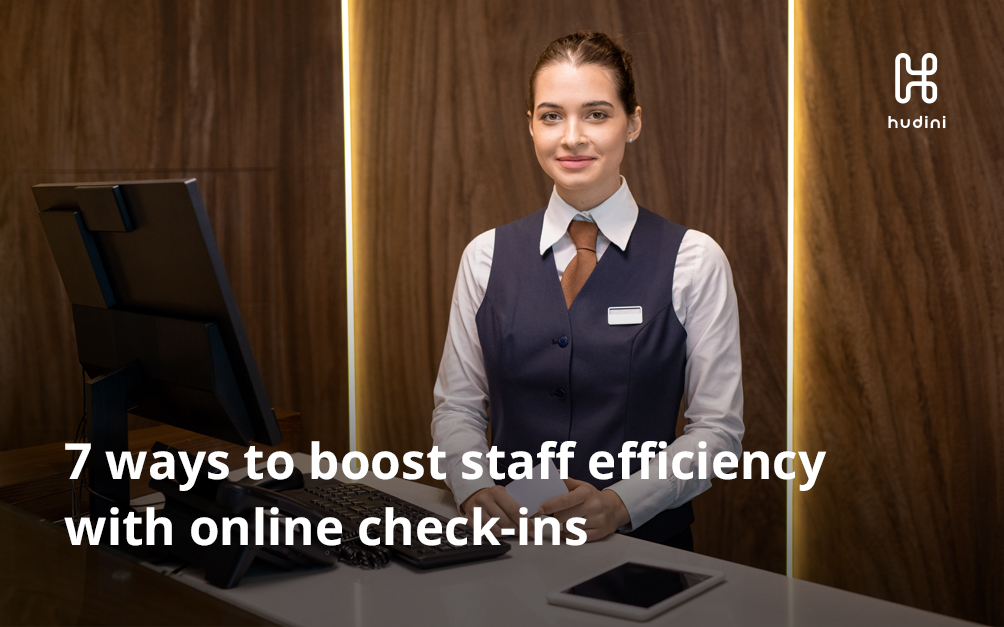
7 ways in which online check-ins boost staff efficiency
- Hudini
A quick and easy check-in is the hospitality equivalent of a great first impression. Unfortunately, the traditional check-in is now associated with long queues and a transactional exchange of documents at the front desk. While guests find it inconvenient, the staff at the front desk often feel overwhelmed by the crowds and repetitive nature of the task.
Hotels are adopting online check-ins because they streamline the arrival process for guests while helping staff do their jobs with more efficiency and less stress. Guests who check-in online have to just upload their IDs and complete the verification with a facial scan. It takes less than three minutes and can be done through several channels.
The Hudini hospitality app, for example, is an omnichannel platform that can be accessed via mobile devices, web browsers and hotel kiosks. While the online check-in process remains the same, guests can choose where and when they complete the arrival formalities. This enables hotels to extend more than one way for hotel guests to check-in online.
Native app: Guests can download the hotel app on their mobile devices and complete the check-in process prior to arrival. The native app doubles up as the digital room key and also helps guests personalize their room’s ambience, place room service and housekeeping requests and converse with the AI-powered chatbot for any assistance.
Progressive Web App (PWA): Guests who’d prefer not to download an app but would still like to experience a technologically-enhanced stay can access the PWA version through a web
browser. The PWA offers the same check-in interface as the hotel app, as well as personalization options.
Kiosk: Guests who’d like to skip the front desk can check-in using the automated kiosk, where they can scan their ID cards, verify their booking and then proceed to personalize aspects such as room level and type.
Assisted check-in: Hotels can also try a hybrid of traditional and online check-ins with assisted check-ins. Here, the guest is welcomed by a staff member who then escorts them to their room. While the guest settles in, the staff member uses the Hudini app to complete the check-in formalities on the guest’s behalf. All the guest has to do is verify the details and sign the digital form.
So, how do online check-ins benefit staff? While the impact of online check-ins is most visible at the front desk, departments such as marketing, guest services and housekeeping are also reporting higher efficiencies and smoother operations driven by various factors.
- Faster check-ins
Hudini’s online check-ins can be completed within 3 minutes and by the guests themselves, reducing the strain on front desk staff. Guests enter their own details and since guest IDs are verified and stored online, paperwork and manual errors are also minimized.
- Better usage of skill sets
Online check-ins free up staff to pay more attention to interaction with guests instead of collecting and copying forms. This also helps them use their skills to truly welcome guests and understand their needs, instead of performing routine and repetitive tasks. Guests, no doubt, also appreciate the extra attention and prompt service.
- Enhanced communication
Online check-in software is linked to the hotel’s PMS and the staff dashboard, presenting a more comprehensive view of the number of guests arriving, their individual preferences and room readiness. Real-time updates make staff better prepared to receive guests and also suggest upgrades that will both delight guests and boost revenues.
- Swift room turnovers
Online check-ins are also synced with housekeeping management software, enabling housekeeping staff to organize their room cleaning schedules and prioritize rooms according to check-in times. They are also informed about the guests’ preferences and selected upgrades, so they can set the room up accordingly. Guests who check-in using the app or PWA also receive notifications as soon as their rooms are ready, thereby reducing wait times and crowding in the lobby.
- Improved upsell suggestions
When guests check-in online, they can share special requests and preferences and select their upgrades as well. This data can be studied by hotel staff to suggest add-ons such as restaurant reservations, happy hours at the cocktail bar, guided tours or late check-outs. Moreover, a reduced workload at the front desk also leaves staff with more time to interact with guests, understand the purpose of their stay and suggest activities that will enhance it.
- Targeted marketing
Data generated by online check-ins can be used to build well-rounded guest profiles, make guest segmentation more detailed and gain insights into patterns of guest behavior. The hotel’s marketing teams can then create targeted ad campaigns and packages that address guests’ preferences, thereby rewarding their efforts with better results.
- Resource reallocation
Instead of concentrating staff at the front desk, hotels can redistribute their people to areas where their expertise and assistance can be better utilized. The distribution can be dynamic, depending on the number of guests checking-in and special events that are occurring at the hotel.
Online check-ins are important tools that equip staff with critical data and also help them manage their time more effectively. With the ongoing staff shortage in the hospitality sector, they will play a decisive role in the smooth functioning of hotels.
Engage, Elevate.

Join our mailing list
Enter your email address


